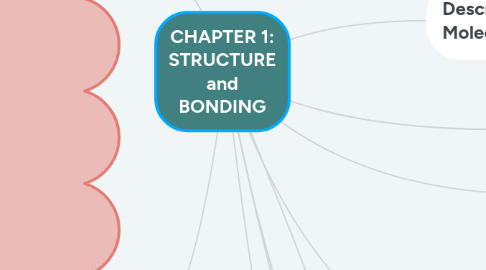CHAPTER 1: STRUCTURE and BONDING
by Neil Artiaga


1. Atomic Structure
1.1. Nucleus
1.1.1. Inside the nucleus
1.1.1.1. Neutrons
1.1.1.2. Electrons
1.1.1.3. Protons
1.1.2. Atomic number
1.1.2.1. isotopes
1.1.3. Mass number
1.2. Orbitals
1.2.1. Kinds of Orbitals
1.2.1.1. S orbital
1.2.1.2. P orbital
1.2.1.3. D orbital
1.2.1.4. F orbital
1.2.2. Electron shells
1.3. Electron Configuration
1.3.1. Aufbau principle
1.3.2. Pauli extension
1.3.3. Hund's Rule
2. sp3 hybrid orbitals and the structure of methane
2.1. 1931
2.1.1. Linus Pauling
2.1.1.1. sp3 hybrid orbitals
2.2. bond angles
3. Drawing Chemical Structures
3.1. condensed structures
3.1.1. skeletal structures
4. Development of Chemical Bonding Theory
4.1. 1858
4.1.1. August Kekule and Archibald Couper
4.1.1.1. carbon is tetravalent
4.2. 1916
4.2.1. G.N Lewis
4.2.1.1. covalent bond
4.2.1.1.1. molecule
4.3. Electron dot structures
4.4. Line bond structure
4.5. Lone pair electrons
5. sp3 Hybrid Orbitals and the Structure of Ethane
5.1. carbon-carbon bond
6. sp2 Hybrid Orbitals and the Structure of Ethylene
6.1. pi bond
7. Valence Bond Theory
7.1. sigma bonds
7.2. bond strength
7.3. bond length
8. sp Hybrid Orbitals and the Structure of Acetylene
8.1. sp hybrid
9. Hybridization of Nitrogen, Oxygen, Phosphorus, and Sulfur
10. Describing Chemical Bonds: Molecular Orbital Theory
10.1. Molecular orbital (MO) theory
10.1.1. bonding MO
10.1.2. antibonding MO
